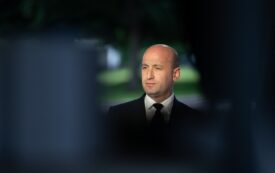Stephen Miller’sinflammatory Rhetoric: Labeling Democrats a “Domestic Extremist Organization”

In a stark display of escalating political animosity, former senior advisor to President Donald Trump, Stephen Miller, has leveled a deeply concerning accusation, labeling congressional Democrats as a “domestic extremist organization.” This inflammatory statement, reported by The Nation, not only demonizes a significant portion of the American electorate but also dangerously blurs the lines of acceptable political discourse in a democratic society.
The Erosion of Civil Discourse
The deliberate categorization of elected officials from a major political party as an “extremist organization” is a potent rhetorical weapon. It moves beyond policy disagreements and instead aims to delegitimize and dehumanize political opponents. Such language, particularly coming from a figure who played a key role in shaping national policy, signals a worrying trend towards the normalization of extreme rhetoric within the political arena. This tactic is designed to incite fear and distrust, making constructive dialogue and compromise increasingly difficult, if not impossible.
Demands for Accountability
As highlighted by The Nation’s reporting, the gravity of Miller’s claims necessitates a robust response. The article suggests that congressional Democrats should unequivocally demand a retraction of these “grotesque claims” or, alternatively, call for his resignation from any future public advisory roles. Failing to challenge such rhetoric risks tacitly endorsing it, further eroding the foundations of civil political engagement. The responsibility lies not only with those directly targeted but with all who value democratic principles and expect a certain standard of behavior from public figures.
The Dangers of Dehumanizing Language
The history of political discourse is replete with examples where the dehumanization of opposing groups has paved the way for more severe consequences. By labeling an entire political faction as “extremist,” Miller is employing a strategy that aims to strip them of their legitimacy and portray them as a threat to national stability. This is a dangerous precedent, as it can embolden those who seek to silence or marginalize dissenting voices through means other than debate and persuasion. The impact of such rhetoric can be far-reaching, influencing public perception and potentially contributing to a more polarized and volatile political climate.
Moving Forward: Rebuilding Trust and Respect
Stephen Miller’s comments serve as a stark reminder of the critical need to safeguard the integrity of our political conversations. While passionate debate is a cornerstone of democracy, the descent into personal attacks and baseless accusations undermines the very principles we aim to uphold. It is imperative for political leaders, media outlets, and citizens alike to reject and condemn such divisive language. Instead, efforts should be focused on fostering an environment where policy differences can be debated respectfully, and where the shared goal of a functioning democracy remains paramount. The call for accountability in response to Miller’s remarks is not merely about political correctness; it is about preserving the health and viability of our democratic institutions.
This article was originally published by The Nation.

